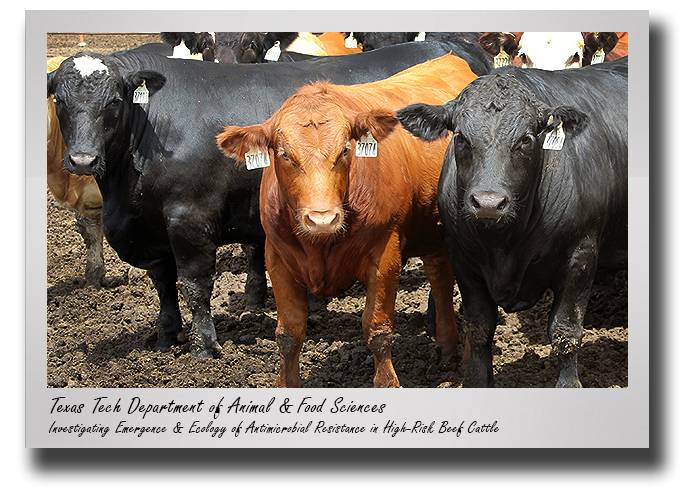NIFA grant investigates antimicrobial resistance in high-risk beef cattle
By: George Watson
 With the world dealing with a global pandemic thanks to the COVID-19 virus, the food
supply chain has seen drastic changes as public consumption and purchasing habits
have changed. Those changes are having a particular effect on supplies of beef, chicken,
pork and other meats.
With the world dealing with a global pandemic thanks to the COVID-19 virus, the food
supply chain has seen drastic changes as public consumption and purchasing habits
have changed. Those changes are having a particular effect on supplies of beef, chicken,
pork and other meats.
Food industry experts and farmers have worked extensively to deliver safe meat for the public, long before the coronavirus ever came into existence. Reducing the amounts of antimicrobials used in food animals is of particular concern in order to produce the healthiest meats possible. Now, that effort will have help from Texas Tech University.
 Kristin Hales, Tech's Thornton Distinguished Chair and an associate professor in the Department
of Animal and Food Sciences, has been awarded a near-$1 million grant as part of a
larger initiative from the USDA to mitigate antimicrobial resistance across the food
chain. She received the award from the USDA's National Institute of Food and Agriculture
(NIFA) for her project, "Investigating the Emergence and Ecology of Antimicrobial Resistance
in High-Risk Beef Cattle."
Kristin Hales, Tech's Thornton Distinguished Chair and an associate professor in the Department
of Animal and Food Sciences, has been awarded a near-$1 million grant as part of a
larger initiative from the USDA to mitigate antimicrobial resistance across the food
chain. She received the award from the USDA's National Institute of Food and Agriculture
(NIFA) for her project, "Investigating the Emergence and Ecology of Antimicrobial Resistance
in High-Risk Beef Cattle."
The project, in collaboration with the Texas Tech University School of Veterinary Medicine in Amarillo, the University of Nebraska in Lincoln and the USDA Agricultural Research Service's U.S. Meat Animal Research Center in Nebraska, will seek to identify how antimicrobial resistance develops and is spread in beef cattle, and develop mitigation strategies to reduce antimicrobial resistance incidents throughout the beef industry.
"To achieve our goals, we have assembled a highly qualified, interdisciplinary team with expertise in food safety, gastrointestinal microbial ecology, microbiome, ruminant nutrition, animal health, disease, epidemiology and outreach," Hales said.
Hales' five-year research project has several objectives in order to attain its goal:
• Understand the emergence and transmission of antimicrobial resistance in high-risk
cattle in the beef production system.
• Implement new, science-based strategies for metaphylactic use of antimicrobials
that reduce antimicrobial resistance spread in high-risk cattle.
• Evaluate baseline levels of antimicrobial resistance reservoirs in commensal and
pathogenic bacteria within high-risk beef cattle longitudinally from feedlot arrival
to harvest.
• Help current and future veterinarians and cattle nutritionists understand potential
food safety risks due to antimicrobial resistance while helping them deliver the best
advice possible for cattle health.
 "Understanding the role of commensal and pathogenic bacteria and their likelihood
or capability of becoming resistant to antimicrobials is difficult because it is a
complex process," Hales said.
"Understanding the role of commensal and pathogenic bacteria and their likelihood
or capability of becoming resistant to antimicrobials is difficult because it is a
complex process," Hales said.
Hales anticipates the study will produce critical information to control the development of antimicrobial resistance and produce science-based methods to mitigate antimicrobial resistance in beef production. Having this information is critical to the food supply and food chain sustainability and to reducing the use of antimicrobials in cattle.
Her first long-term goal in the research project is identifying strategies that reduce antimicrobial resistance in a feedlot cattle production setting. The second long-term goal is to develop an alternative to the drug tylosin phosphate that is used to control liver abscesses in cattle.
The expectation is that by identifying sources of antimicrobial resistant bacteria and reducing the amount of antimicrobials used in beef cattle, the potential spread of antimicrobial resistance can be reduced, therefore preserving antimicrobials for human and animal therapeutic uses, improving food safety and strengthening the food supply chain.
CONTACT: Kristin Hales, the Thornton Distinguished Chair in Animal Science, Department of Animal and Food Sciences, Texas Tech University at (806) 834-5354 or Kristin.Hales@ttu.edu
0603NM20
Editor's Note: A new online, video-orientated Red Raider Orientation is now available for our Fall 2020 incoming students. The microsite features a 'Meet the Deans' introduction, six CASNR department videos, three 'How To' videos, four 'Helpful Links' and a FAQ section.
Davis College NewsCenter
-
Address
P.O. Box 42123, Lubbock, Texas 79409-2123, Dean's Office Location:Goddard Building, Room 108 -
Phone
(806)742-2808 -
Email
kris.allen@ttu.edu
